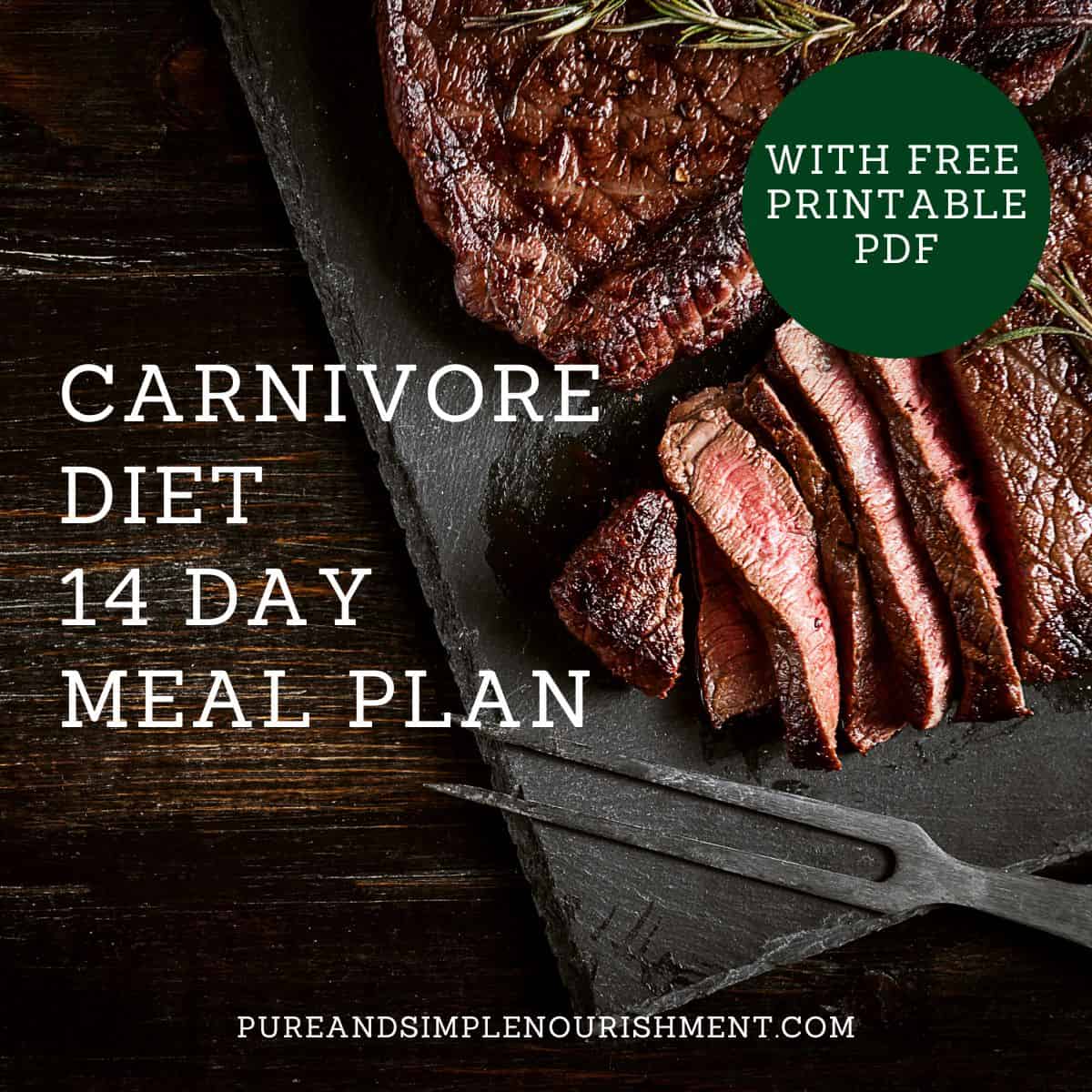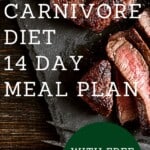This post reviews the carnivore diet, provides a free 14 day carnivore diet meal plan including a printable PDF, and shares carnivore recipes and tips.

Disclaimer: some of the links in this post are affiliate links whereby I make a small commission if you purchase the product through that link. This does not cost you anything extra and helps me to keep this website running.
Before we get to the carnivore diet meal plan, I thought it was important to review what the carnivore diet is. And as always, like any other diet or nutrition change, before considering trying a carnivore diet, be sure to discuss it with your doctor or other healthcare provider first to see if this type of diet is right for you as this diet can have significant risks.
Table of Contents
- What is the carnivore diet?
- Potential benefits of a carnivore diet:
- Risks of the carnivore diet:
- Foods allowed on the carnivore diet:
- Foods to avoid on the carnivore diet:
- Carnivore diet meal plan:
- Carnivore diet recipes:
- Carnivore diet tips:
- Frequently asked questions:
- Other health info you will want to read:
- Our expertise:
What is the carnivore diet?
The carnivore diet is a diet where you only eat animal foods, and avoid all plant foods. It is a very extreme elimination diet.
The diet is based on the idea that our ancestors evolved eating mostly meat and fish, and that the high intake of carbohydrates and plant based foods that is common now is responsible for many different health issues and chronic diseases.
A carnivore diet is also based on the idea that the high intake of plants that is often recommended today is not ideal for health. Plants naturally produce a number of different chemicals and compounds to help protect themselves from pray including oxalates, salicylates, phytic acid or phytates, lectins, and more. It is believed that these compounds can be harmful to the human body by acting as anti-nutrients and having other negative effects, so by avoiding eating them your health will improve.
The carnivore diet is different from other diets such as a keto diet in that the carnivore diet aims for a zero carbohydrate intake. So even though the goal of a carnivore diet isn't to put your body into ketosis, this would happen naturally given the lack of carbs on the diet.
The carnivore diet is also different than a paleo diet because on a paleo diet you are encourage to eat carbohydrates in the form of fruit and vegetables, while a carnivore diet does not allow any fruits or vegetables.
Potential benefits of a carnivore diet:
Now, before we go through the potential health benefits of the carnivore diet I wanted to emphasize that most of this is based on anecdotal reports, as so far there has only been one study that has been published on the carnivore diet so there is still a lot that we don't know.
1. Weight loss
Similar to a keto diet, eating a strict animal food based diet could help you lose weight and improve body composition because you are shifting your main energy source from carbs to fats, a state that is often referred to as being "fat-adapted."
In addition, fat and protein are very satiating. This allows you to feel full for longer, and studies have shown that becoming fat-adapted improves your hunger hormones, further regulating your appetite.
2. Decreased inflammation
Multiple studies have shown that a ketogenic diet can decrease inflammation and be beneficial for many different health conditions which are driven by inflammation including cardiovascular disease, cancer, Alzheimers, Parkinsons, epilepsy, depression, anxiety, inflammatory arthritis, psoriasis, pain, diabetes, migraines etc.
However, it is important to note that no study has actually shown that the carnivore diet decreases inflammation, and that evidence is taken from studies on the keto diet, which is similar, but not the same.
3. Decreased pain
Studies in animals and humans have shown that a low-carbohydrate diet can decrease pain.
4. Improved digestion
Studies have shown that a keto diet can be helpful for patients with irritable bowel syndrome (IBS).
Risks of the carnivore diet:
There are many potential risks of following a carnivore diet, and these need to be taken seriously. That is why, if you are considering trying this diet, be sure to discuss it with your doctor or other health care providers first.
1. Nutrient deficiencies
Because you are eliminating a lot of foods with essential vitamins and minerals when on the carnivore diet you can easily develop vitamin and mineral deficiencies. In particular, you can become low in vitamin C or develop scurvy. I have seen a patient develop scurvy and end up in the hospital because they were so sick after following a carnivore diet, so this is a significant risk that needs to be taken seriously.
2. Lack of fiber
Fiber comes from plants, so you get almost no fiber on a carnivore diet, and fiber contributes to healthy bowel movements and good gut bacteria. A lack of fiber could lead to constipation and some studies have shown that diets low in fiber can increase your risk of colon cancer.
3. Loss of gut bacteria
Eating a diverse diet including one that is full of different fruits and vegetables can increase the diversity of the bacteria in your gut which is known to be beneficial for health. By eliminating a number of foods, overtime, you can therefore lose some of the diversity of your gut microbiome.
4. It can be stressful
Doing any type of restrictive diet, especially one that eliminates as many foods as the carnivore diet does can be very stressful. We know that increased stress is not good for your health, so if the stress of doing this type of diet is more than the actual benefit you might see from the diet itself, it is likely a diet that isn't right for you. Because it is so restrictive it can also be very hard to maintain in the long term.
5. High in red meat
A carnivore diet is high in red meat and studies have shown that high red meat intake can increase the risk of breast cancer, colon cancer and heart disease.
Foods allowed on the carnivore diet:
*** If you are looking for a full carnivore diet food list, be sure to read my posts on the Carnivore Diet Food List and Carnivore Diet Snacks and download my free printable PDF food list.
- Meat - this includes any type of unprocessed meat including beef, lamb, pork, game meats, chicken, turkey, etc.- you would need to avoid processed meats like hot dogs and deli meats which include fillers, sugars and other ingredients which aren't allowed on a carnivore diet.
- Fish - any type of unprocessed fish such salmon, tuna, Mahi Mahi, cod, mackerel, sardines, crab, scallops, mussels, shrimp etc.
- Other animal products - including eggs, bone marrow, lard, bone broth (made without vegetables), etc.
- Full fat and low lactose dairy products (in small amounts) - including butter, heavy cream, ghee, hard cheese, etc. - ideally raw dairy is preferred on a carnivore diet.
- Seasonings - including salt, black pepper, herbs and spices. Be sure to avoid any seasonings with sugars or carbohydrates.
- Water
Foods to avoid on the carnivore diet:
- Fruit
- Vegetables
- High-lactose dairy products such as soft cheese, milk, yogurt, etc.
- Legumes
- All additives including but not limited to, nitrates, artificial flavours, natural flavours, nitrites, MSG, etc.
- Nuts and seeds
- Crop oils or vegetable oils such as canola oil, soy bean oil etc.
- Imitation meats or plant based meats
- Grains
- Alcohol
- Sugars
- Beverages other than water
In order to follow the carnivore diet properly you need to include organ meats in your diet (things like kidneys, livers, hearts etc). You also want to ensure that the meat and fish you are eating are naturally raised. This means pasture raised meats (ie. grass-fed beef) and wild caught fish.
Carnivore diet meal plan:
Now that we've discussed what the carnivore diet is and what you can and can't eat while doing it, I want to provide you with a sample meal plan. I would also encourage you to do more research on the carnivore diet before just starting it on a whim. The book The Carnivore Code by Dr. Paul Saladino is a helpful resource. You should also discuss it with your doctor beforehand as this diet can be very dangerous depending on your underlying health issues and I have seen patients end up hospitalized as a result of this diet.
7 day carnivore diet meal plan:
Day 1:
- Breakfast: Bacon and eggs
- Lunch: Bone broth and roasted chicken
- Snack: Sardines
- Dinner: Tuna and soft boiled eggs
Day 2:
- Breakfast: Steak and eggs
- Lunch: Salmon and roasted duck
- Snack: Bacon
- Dinner: Beef burgers
Day 3:
- Breakfast: Chicken livers and scrambled eggs
- Lunch: Turkey burgers
- Snack: Hard boiled eggs
- Dinner: Baked salmon
Day 4:
- Breakfast: Scrambled eggs with smoked salmon
- Lunch: Pork burgers
- Snack: Pork rinds
- Dinner: Mahi Mahi and bone broth
Day 5:
- Breakfast: Turkey omelette
- Lunch: Beef liver with scrambled eggs
- Snack: Canned salmon
- Dinner: Pork chops
Day 6:
- Breakfast: Kefir and sunny side up eggs
- Lunch: Roasted chicken with bacon
- Snack: Canned tuna
- Dinner: Bison burgers
Day 7:
- Breakfast: Sausages and scrambled eggs
- Lunch: Shrimp and scallops
- Snack: Sardines
- Dinner: Steak and shrimp
14 day carnivore diet meal plan:
If you looking for even more ideas for what to eat on the carnivore diet then you can download my free 14 day carnivore diet meal plan below. Simply leave your email address and you will be sent a PDF 14 day carnivore diet meal plan.
Carnivore diet recipes:
Here are just a few recipes that are carnivore that you can enjoy:
Carnivore diet tips:
Are you thinking about trying the carnivore diet? Before you do, there are some important things you need to consider.
1. Talk to your doctor
Before starting any new diet or nutrition plan it is always best to speak to your doctor and other health care providers first. The carnivore diet is a very extreme diet and it has many potential risks. As well, high protein diets and high fat diets can be very dangerous if you have certain health conditions such as kidney failure or kidney disease. As such, this type of diet would not be ideal for most people, and if you are going to try it you should be monitored closely for vitamin and mineral deficiencies.
2. Do your research and prepare
The carnivore diet is not something you can just start on a whim. The best way to ensure success is to do your research, and prepare for this diet before starting it. There are many books that can be helpful to read before you start including The Carnivore Code by Dr. Paul Saladino and The Carnivore Diet by Dr. Shawn Baker. You will also want to stock your fridge and freezer with pasture raised meat and wild fish so that you have all the food on hand that you will need.
3. Find a friend
You will be much more likely to succeed on the carnivore diet if you do it with someone. Having a support system when you try any new dietary protocol can be extremely helpful and will help make the transition to this way of eating so much easier.
4. Clean our your pantry and kitchen
Before you start a carnivore diet I would recommend going through your kitchen and pantry and getting rid of and donating the foods that you won't be able to eat. This way you won't be tempted by things like junk food, candy and other foods that you will no longer be eating.
Frequently asked questions:
No. Coffee is not allowed on a strict carnivore diet, however I do see some people advocating for a more flexible carnivore diet where people are allowed to consume coffee and tea.
Yes. On the carnivore diet, your body will go through a process called gluconeogenesis where some protein is converted into glucose which can be used for exercise and other body functions. If you exercise a lot or do a lot of cardio, some carnivore diet experts do allow people to consume some fruits to help compensate for this type of exercise, so be sure to listen carefully to what your body needs.
A carnivore diet eliminates all foods from plants and only allows you to eat food from animals. By doing so it naturally eliminates all carbohydrates and would put you into ketosis. It is basically an extreme version of a keto or low carbohydrate diet which limits, but does not entirely eliminate carbohydrates, with the goal of getting your body into ketosis.
The paleo diet is a lot more flexible than a carnivore diet. Paleo allows you to eat many different foods including meat, fish, fruits, vegetables, nuts and seeds and certain sweeteners. It still allows you to eat carbohydrates and food from plants while the carnivore diet only allows you to eat foods that come from animals and eliminates all plant foods.
No I do not. This type of diet has too many potential risks and I have seen a patient develop scurvy from it. I also think it is way too stressful. Food is meant to be enjoyed and I would not find this way of eating enjoyable or sustainable.
Other health info you will want to read:
Our expertise:
Dr. Erin Carter, MD, FRCPC, is a physician with board certifications in internal medicine and rheumatology. She is passionate about nutrition, environmental health and low toxicity living and has been doing research and publishing information in this area for years.






Marie
Instead of cream can I use Half/half in my coffee
Dr. Erin Carter
Neither coffee or half and half would be considered carnivore but I would do whatever works best for your body.
Kim
Hi, I just started a carnivore diet. I was wondering if chia and hemp seed are allowed. Also what about cream cheese sour cream ,yogurt and whole milk. I read they were allowed but this article said no.
Thank you,
Erin Carter
Chia and hemp seeds are not allowed since they are not animal products. In terms of the dairy this really seems to depend on who you ask. I always say to do what works best for you body because we are all different.